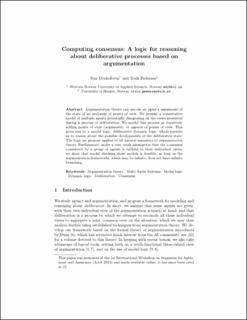Computing Consensus: A Logic for Reasoning About Deliberative Processes Based on Argumentation
Peer reviewed, Journal article
Accepted version
Permanent lenke
https://hdl.handle.net/11250/2730944Utgivelsesdato
2019Metadata
Vis full innførselSamlinger
- Import fra CRIStin [3580]
- Institutt for byggfag [272]
Originalversjon
Dyrkolbotn, S., & Pedersen, T. (2019). Computing consensus: A logic for reasoning about deliberative processes based on argumentation. In M. Slavkovik (Ed.), Multi-agent systems: 16th European Conference, EUMAS 2018, Bergen, Norway, December 6–7, 2018, Revised Selected Papers (pp. 205-219). 10.1007/978-3-030-14174-5_14Sammendrag
Argumentation theory can encode an agent’s assessment of the state of an exchange of points of view. We present a conservative model of multiple agents potentially disagreeing on the views presented during a process of deliberation. We model this process as iteratively adding points of view (arguments), or aspects of points of view. This gives rise to a modal logic, deliberative dynamic logic, which permits us to reason about the possible developments of the deliberative state. The logic we propose applies to all natural semantics of argumentation theory. Furthermore, under a very weak assumption that the consensus considered by a group of agents is faithful to their individual views, we show that model checking these models is feasible, as long as the argumentation frameworks, which may be infinite, does not have infinite branching.
Beskrivelse
This is an author's accepted manuscript version of an article published by Springer in the Lecture Notes in Computer Science series. The final authenticated version is available online at https://doi.org/10.1007/978-3-030-14174-5_14
